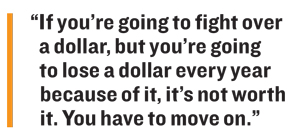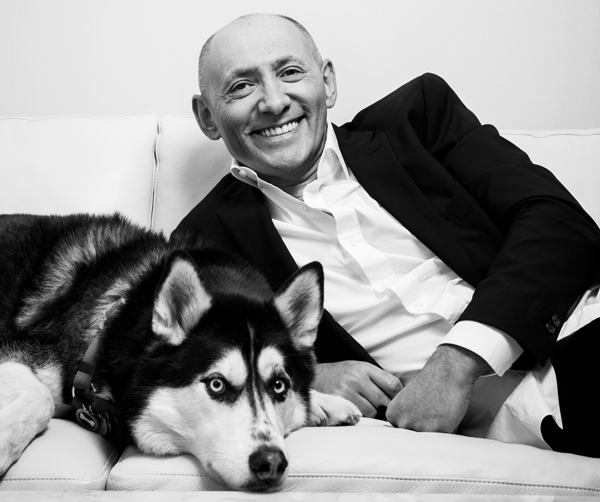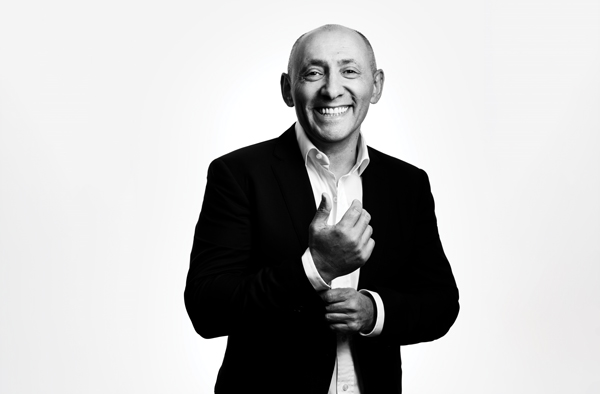UPDATED, 8:05 a.m., Feb. 5: Successful immigrants and developers share at least one quality: optimism, an unshakeable belief that there is a better life to be had in a new country … or a new building.
Ukrainian-born Neil Shekhter, founder and CEO of Santa Monica-based NMS Properties, is relying on that buoyant attitude to lift him and his family past the sort of setback that might have crushed another entrepreneur. As a successful developer with a portfolio of 2,200 residential units and 30 buildings, NMS went in search of financing in 2010. Shekhter ultimately found a willing partner in AEW Capital, a real estate investment manager, and they put together a nine-building portfolio in Santa Monica that they owned in common.
Six years ago, Shekhter attempted to exercise what he believed was a clause in the contract with AEW that allowed him to buy it out for $106 million. AEW executives disagreed and litigation ensued, with AEW ultimately winning a messy court fight rife with charges and countercharges of fraud and forgery. The decision allowed AEW to dispose of the entire nine-building partnership for $430 million.
All his appeals exhausted, Shekhter, his sons and wife have thrown themselves back into NMS and currently have at least two Westside properties under development — an 89-unit apartment complex at 11001 Pico Boulevard and a 40-unit mixed-use development in Santa Monica. According to the developer, more projects are in the offing.
It’s quite a comeback, but perhaps not any more remarkable than a young Jewish refugee’s realization of the American dream in what he still regards as “the best country in the world.”
Shekhter’s family immigrated to the United States in 1979, part of a wave of newcomers fleeing the then-Soviet Union’s endemic anti-Semitism. Since the Soviet authorities allowed exiting Jews to take only $200 apiece with them, the Shekhter family’s travel and resettlement in a tiny apartment on Ogden in West Hollywood was financed by Jewish communal organizations.
Shekhter attended L.A. City College and Santa Monica College to improve his English. Later on, he acquired an auto repair facility near Pico and La Brea and began driving a cab at a time when the occupation was so popular among recent Russian Jewish immigrants that the taxi stand at the Century Plaza Hotel was known as “Little Odessa.” He then began employing other cabbies and running a maintenance facility in Los Angeles.
 Shekhter also became an active day trader, working the markets until 1 p.m. and then managing his real estate business in the afternoon. After the tech bubble burst, he moved away from stocks and cabs and into managing a growing property portfolio, mostly on the lucrative Westside.
Shekhter also became an active day trader, working the markets until 1 p.m. and then managing his real estate business in the afternoon. After the tech bubble burst, he moved away from stocks and cabs and into managing a growing property portfolio, mostly on the lucrative Westside.
NMS was the result, and despite the AEW debacle, that undiminished optimism leads him to believe “our best years are ahead of us.”
You grew up in Ukraine in the former Soviet Union. What prompted you to come here? I was only 16 at the time. It was my mother’s and grandparents’ decision. In August of 1979, we left the Soviet Union. We received refugee status because we’re Jewish, and in the Soviet Union they persecuted Jews. Even from the time I was in school, the kids would try to pick fights and they would make fun just because of your ethnicity. Being a Jew in those days in the Soviet Union, you didn’t get many opportunities in life. Most Jews picked up and left. Some went to Canada or Australia. But the majority went to Israel or the United States.
When did you decide to get into real estate? When I came here, I used to work in a store on Fairfax Avenue. The people who owned the store were two Holocaust survivors. They told me that they owned an apartment building and that the building provided a nice source of income for them. That was my first thought about being in real estate. Fast-forward to 1982. We bought our first house in West Hollywood on La Jolla Street. It was a duplex. Then in 1985, I bought my first income property around Pico and La Brea.
You started acquiring additional properties? I always saved money and invested it in real estate because I felt that as you get older, you pay off your loan and retire. That was kind of the dream. I bought my first apartment building in Beverly Hills. As I was buying other buildings, I thought that one day I would want to develop properties myself. I bought my first lot in Northridge next to a building I already owned. In 2003, I had my first building with 26 units. After that, I started developing on the Westside only.
What prompted you to reach out to AEW to get the infusion of capital? In 2010, we were in a recession and I was looking for ways to grow my portfolio. At the time, I owned several development sites. I was looking to leverage the market. The idea was to get somebody who would invest money with us, get a nice return and then get out.
When did you decide to exercise the repayment clause? The deal was they were supposed to receive 1.75 times the investment or 24 percent per year — whichever was greater. The language was in our JV agreement. Through the years, [AEW executive] Eric Samek always confirmed to me that that was the deal verbally. We would even joke about it. Then in 2013, when I sent them a letter telling them that we wanted to buy them out, that’s when things went bad.
How did they react? At that time, I didn’t know that the attorneys I hired did not make sure the agreement was ironclad. So when we sent them a letter telling them we were going to buy them out, first they didn’t respond. Then they told us, “That’s not the deal.” After that, things started going south. They started to treat us differently. All of a sudden, they ordered an audit. They started to look to see if they could find anything that we did wrong. The auditor discovered that we actually did something wrong. Somehow we did not report 32 cents. I realized at that point that things were not going well for me. They weren’t settling with me based on our agreement. So after that, litigation started.

Shekhter with the family dog, Blanco
They claimed you falsified documents? Correct. They said a lot of things about me. That was their tactic. They also said we misappropriated funds and all kinds of other stuff. None of it was true. They were never able to prove anything at a trial. The mistake I made was I started this whole litigation with a solo-practitioner attorney who was not equipped to deal with a case like that. That was the biggest mistake I made — plus the mistake I made myself, which was destroying my hard drive.
Why did you destroy the hard drive? They got an order from the judge saying they could copy any and all records from any and all media that we have, including my home computer. I didn’t want them to copy certain things on my computer because it had nothing to do with our business developing nine properties. So I deleted certain things.
You deleted personal files? Yes, I did it. I’m not disputing it. I wanted to protect the privacy of my family, and to me, that was important. I kind of regret it, of course, because that made my whole case much worse. Because now the court saw that I did something wrong. The litigators that AEW hired knew how to play this game, and I didn’t.
What did you go through personally during that period? It was very tough. You can’t conduct business the normal way anymore, because the lenders now look at you in a different light. The banks told me: “Until this litigation is over, we’re not going to do business with you because you’ve been alleged to have done all these things. We don’t know if you did it or not, but until it’s resolved, we can’t do any business.” So that pretty much just puts you almost out of business.
Were you surprised how ugly things got in court? Listen, if I could take everything back, I would never file a lawsuit. I would never be in litigation, because I learned a lot from this. I learned that in court, you never know what’s going to happen. One party can talk a judge into certain things and make them believe certain things. Then your life is basically in a judge’s hands. I never saw a jury in any of the litigation. I never got a jury trial. There was some kind of bench proceeding. That’s as far as this case went.
What prompted you just to walk away from those properties? It was a lot of money, more than $400 million. It was for the business and for my family. It not only took a huge toll on my family — my children and my wife. I just decided that we are — thank God — healthy and we know what we’re doing. By being able to go back out and do business the normal way, by being able to get normal loans, by dealing with normal banks. The money that we will make every year far outweighs what we were fighting over. If you’re going to fight over a dollar, but you’re going to lose a dollar every year because of it, it’s not worth it. You have to move on.
When you first emerged from that, how many properties did you have left? How did you start rebuilding your life and your portfolio? As this litigation was ongoing, our lives were not put on hold. We still continued business. The difference was the cost of financing was a lot more expensive. We were still able to develop; we were still able to buy. Our team has properties today under construction in several cities. Business goes on, and today we’re happy that now the litigation is behind us. Right now, we have a lot of nice projects in Santa Monica and the Westside. And you will see some of them under construction. Some are going to start this year and next year. A lot more than we lost, let’s put it this way.
What’s your biggest regret from that time? I will tell this to anybody: When you go into a partnership, make sure you get the best representation money can buy. And even then have someone else double-check it. The biggest regret is that I did not have the best people representing my interests. That backfired on me in a big way. So it’s hard when you spend so many years building something, and then you lose it all.
Did you ever get angry? Yes. I would be lying to say that I wasn’t. It’s very hard when people do things like what happened to me. I come from a different world. In my world, the way I was raised, shake hands, and to me, that’s a deal. In this country, sadly enough with all the lawyers, people create documents 5 to 10 inches thick. And they can bury a couple words in there that will change your whole life. And people don’t realize until it hits them.
What advice would you give other people facing hard times? My advice would be never to lose faith. Always fight for what you believe. Sometimes you have to step back and think what’s the best way to move forward. Sometimes that means you have to give something up to move forward. If you have to take three steps back to be able to take nine steps forward, then that’s what you have to do. So that’s what I did. I don’t regret it. Life goes on. We have a great team, and we’ll be able to do great things.
Are you optimistic about the future? Very optimistic. That’s my personality. To be a good developer, you have to be an optimist. It is hard not to look back. When you work so hard and lose it all, it’s not that easy. It is what it is. It’s life. I guess that’s the way it was meant to be. There’s nothing I can do about it. Just look to the future.
— Edited and condensed for clarity.
Correction: An earlier version of this story said Shekhter worked as a day trader until 1 p.m. and then returned to his cab business in the afternoon. He had left the cab business by then and went to work in the afternoon managing his real estate business.

